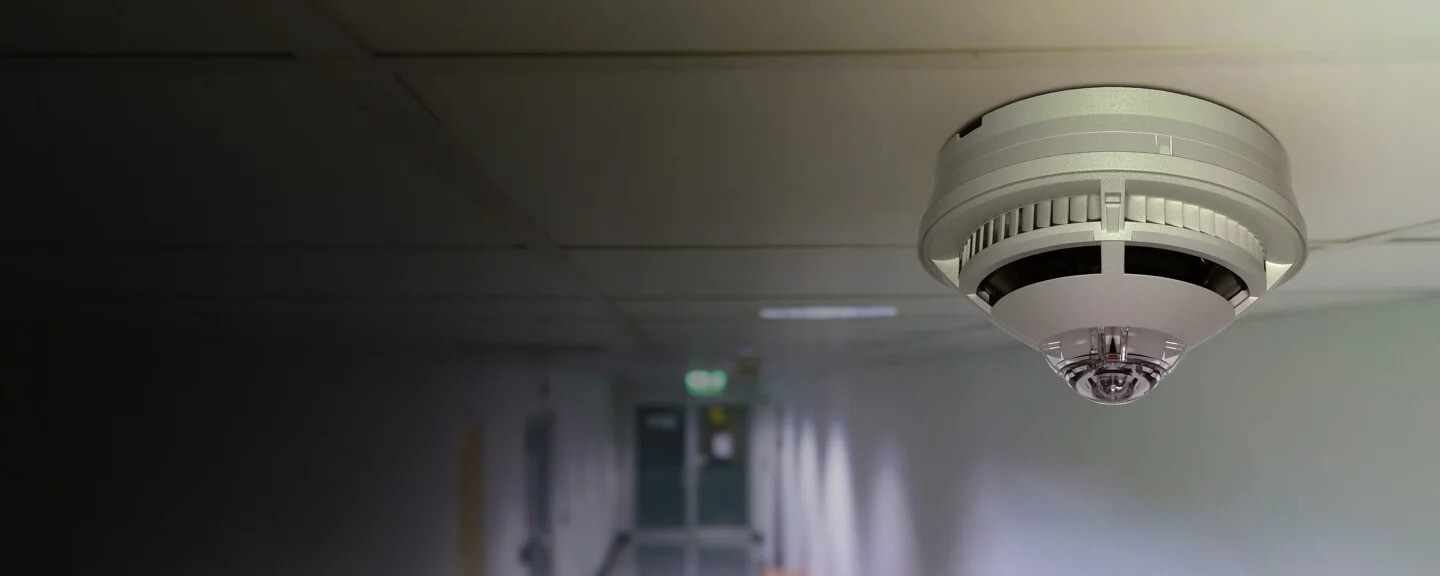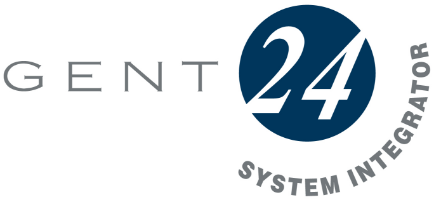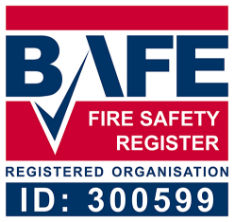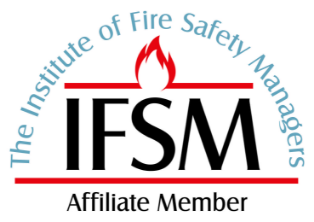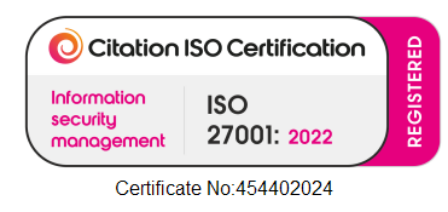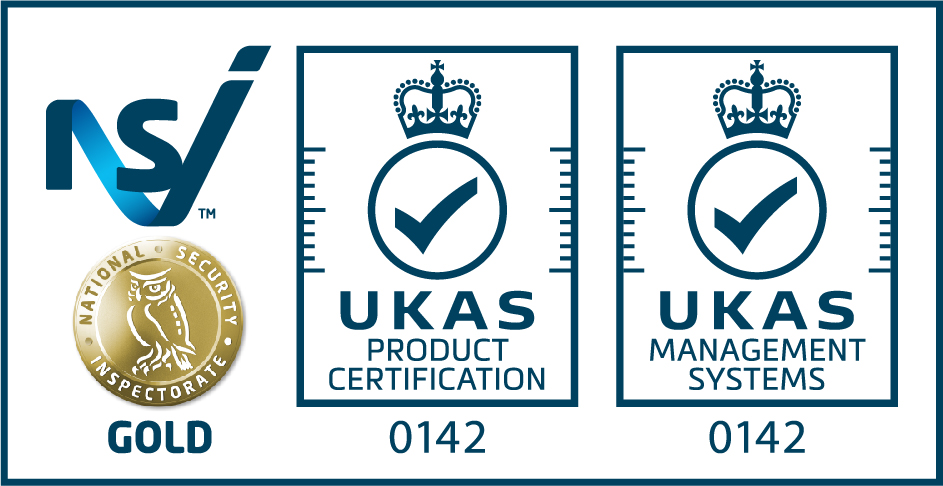A fire alarm system is the most critical safety installation in any commercial building, providing early warning that can save lives, protect property, and keep your business compliant with regulations. At Logic Fire and Security, we understand that navigating fire safety requirements can be overwhelming for business owners and facilities managers who are juggling multiple responsibilities while carrying the weight of keeping everyone safe.
With over two decades of experience in fire safety, our team of fully trained engineers delivers comprehensive fire alarm solutions across the UK. Whether you need a new installation, system upgrade, or regular maintenance, we provide reliable expertise that gives you peace of mind and ensures regulatory compliance, underwritten by our BAFE SP203 Third-party Accreditation.
What is a Commercial Fire Alarm System?
A commercial fire alarm system consists of interconnected electronic devices designed to detect fire or smoke and alert building occupants while notifying emergency services. These life safety systems operate around the clock to monitor for signs of fire through various detection methods.
The primary functions of a commercial fire alarm system include:
- Detection – Using smoke detectors, heat detectors, and manual call points to identify potential fires
- Notification – Alerting occupants through audible alarms, visual indicators, and sometimes voice messages
- Monitoring – Self-checking system integrity and detecting faults
- Controlling – Activating associated systems like HVAC shutdown, elevator recall, and emergency lighting
Commercial fire alarm systems are more sophisticated than residential systems, offering advanced features such as addressable detection capabilities that pinpoint the exact location of a fire, integration with building management systems, and 24/7 monitoring services.
Components of a Fire Alarm System
A comprehensive commercial fire alarm system typically includes:
- Fire alarm control panel – The central “brain” that receives signals from detection devices and controls response
- Initiation devices – Including smoke detectors, heat detectors, duct detectors, and manual call points (break glass units)
- Notification devices – Sounders, strobes, and combined audio-visual alarms
- Power supplies – Primary power and backup battery systems
- Remote signalling equipment – For alerting the fire brigade via a monitoring station
These components work together to create a reliable safety network that provides early warning and helps coordinate emergency response.
What are the 4 Main Types of Fire Alarm Systems?
Fire alarm systems can be broken down into four primary types, each with distinct advantages for different applications. Understanding the differences will help you determine which system best suits your building’s requirements.
1. Conventional Fire Alarm Systems
Conventional systems divide buildings into broad zones, with detectors and call points wired to specific zone circuits on the control panel. When activated, the panel identifies the zone but not the specific device, requiring physical investigation to locate the exact point of activation.
Best suited for: Small to medium-sized premises with simple layouts, such as small offices, shops, or restaurants.
2. Addressable Fire Alarm Systems
Addressable systems represent the current industry standard for commercial buildings. Each device has a unique electronic address, allowing the control panel to identify the precise location of fire detection. This provides faster response times and reduces false alarm investigations.
Best suited for: Medium to large commercial buildings, office complexes, hotels, schools, and healthcare facilities.
3. Wireless Fire Alarm Systems
These systems use radio frequency signals rather than physical wiring to connect devices to the control panel. They offer flexibility and reduced installation disruption, making them ideal for heritage buildings or locations where physical wiring would be impractical.
Best suited for: Listed buildings, temporary structures, buildings with asbestos, or premises where minimal disruption during installation is required.
4. Twin Wire Fire Alarm Systems
Twin wire systems use a single cable for both detection devices and alarm sounders, simplifying installation and reducing costs. However, they offer less specificity than addressable systems.Best suited for: Small to medium commercial installations where cost efficiency is a priority but zoning is still required.
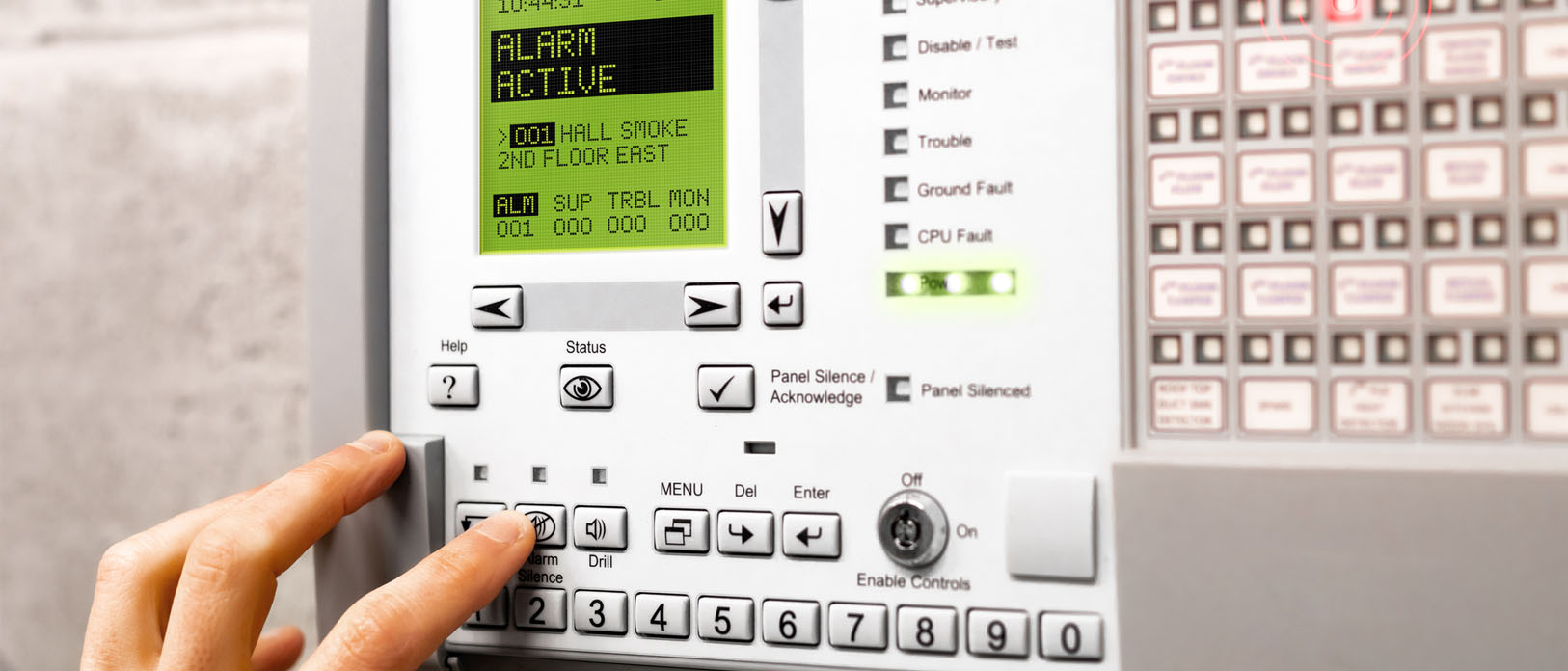
What is the British Standard for Commercial Fire Alarm Systems?
Commercial fire alarm systems in the UK must comply with British Standard BS5839-1:2025, which provides recommendations for the planning, design, installation, commissioning, and maintenance of fire detection and alarm systems.
The standard categorises systems based on their primary purpose:
- Category L Systems – For the protection of life, with varying levels from L1 (full building coverage) to L5 (specific fire risk)
- Category P Systems – For property protection, with levels from P1 (comprehensive) to P2 (specific high-risk areas)
- Category M Systems – Manual systems with no automatic detection
Most commercial buildings require at least an L2 or L3 system, which provides automatic detection in escape routes and high-risk areas. The specific category recommended for your premises will be determined during a comprehensive fire risk assessment.
Fire Alarm Design Process
The design of your fire alarm system should always follow the BS5839 standard. Prior to design, your building should undergo a thorough fire risk assessment to identify the recommended level of coverage. This assessment will consider:
- Building size and layout
- Occupancy levels
- Types of activities performed
- Travel distances to exits
- High-risk areas requiring special attention
Once the assessment is complete, a qualified fire alarm designer will create a system specification that includes:
- Type and category of system
- Device placement and spacing
- Wiring requirements
- Battery backup calculations
- Interface with other building systems
Following installation, you’ll receive all relevant certification including a Fire Alarm Design Certificate documenting the system specifications and confirming compliance with relevant standards.
Do All Commercial Premises Need a Fire Alarm?
The simple answer is: not all, but most do. The Regulatory Reform (Fire Safety) Order 2005 requires that all commercial premises have an appropriate fire detection system, but the specific requirements depend on several factors.
Generally, if your business employs more than five people, you are legally required to have some form of fire alarm system installed. However, the exact type and extent of the system needed depends on:
- The size and layout of your premises
- The number of people on site
- The nature of your business activities
- The fire risk level identified in your fire risk assessment
Even small businesses with fewer than five employees must have adequate fire safety measures in place, though this might be as simple as basic smoke detectors in very low-risk environments.
When is a Fire Alarm System Mandatory?
A fire alarm system becomes mandatory in commercial premises when:
- The building is large or complex enough that a fire might not be immediately noticed
- There are high-risk activities taking place on the premises
- The building has sleeping accommodation
- The premises are used by vulnerable individuals
- The fire risk assessment identifies that a system is necessary
For most businesses, installing a comprehensive fire alarm system is not just a legal requirement but a crucial safety measure that protects lives, property, and business continuity.
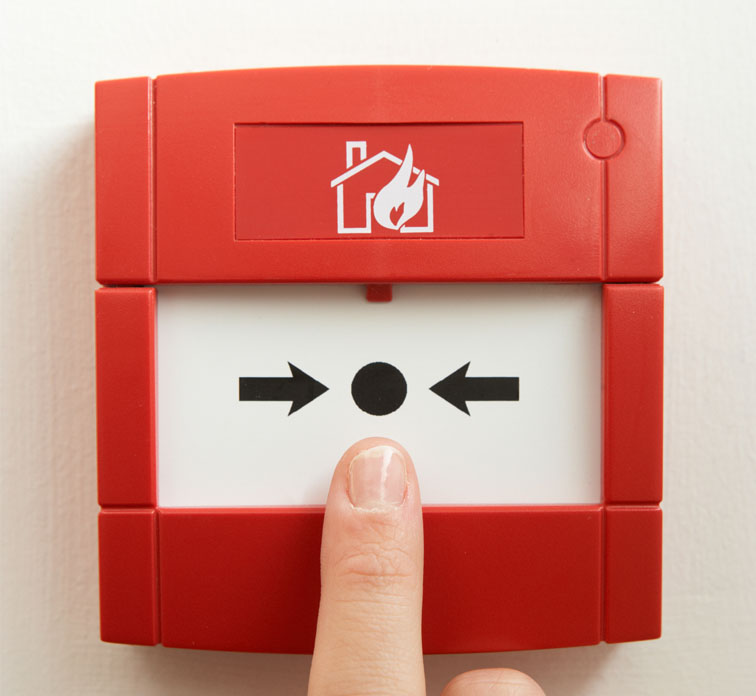
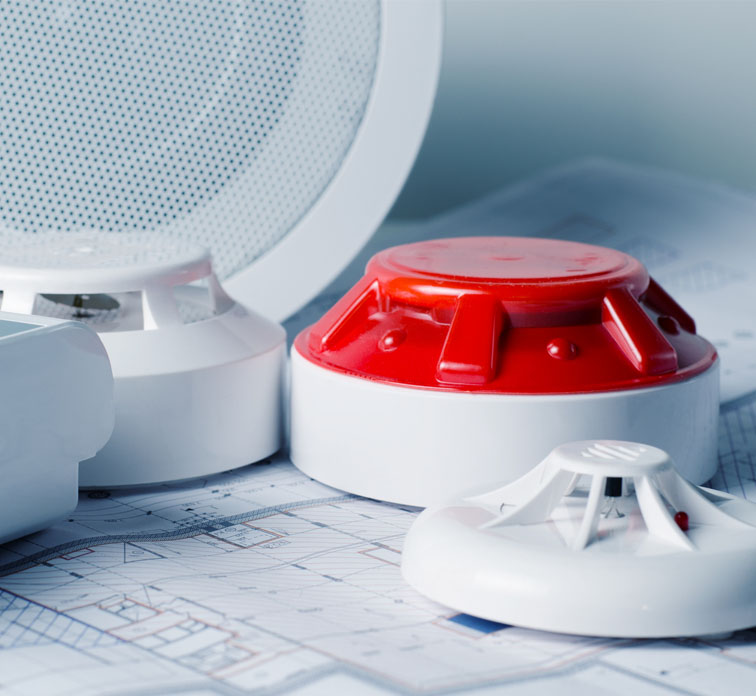
Fire Alarm Maintenance: Ensuring Continued Protection
A fire alarm system is only effective if it’s properly maintained. Regular servicing is essential to ensure reliable operation and compliance with regulations. BS 5839-1:2017 recommends:
- Weekly tests of manual call points (rotating through different points)
- Quarterly servicing of the entire system by a competent person
- Annual inspection and testing of all devices in the system
Commercial fire alarm maintenance should typically be performed on a bi-annual basis to meet British Standards and UK fire safety legislation. Each maintenance visit should include:
- Testing of the control panel functions
- Checking and testing all detection devices
- Examining battery condition and power supplies
- Verifying alarm sounders and visual indicators
- Inspecting wiring and connections
- Updating the system logbook with test results
Following each service, you should receive a detailed inspection report highlighting any issues that need attention. This documentation is crucial for demonstrating regulatory compliance to insurers, fire authorities, and health and safety inspectors.
The Cost of Neglecting Maintenance
Failing to maintain your fire alarm system can have serious consequences:
- Increased risk of system failure during an emergency
- Potential for false alarms that disrupt business operations
- Invalidation of building insurance policies
- Non-compliance with legal requirements leading to potential prosecution
- Compromised safety of building occupants
By implementing a regular maintenance schedule with a qualified provider like Logic Fire and Security, you ensure your system remains in optimal condition and ready to perform when needed most.
Choosing the Right Fire Alarm System Provider
When selecting a fire alarm system provider, consider these essential factors:
- Accreditations – Look for companies with BAFE SP203 certification, which demonstrates competence in fire alarm design, installation, and maintenance.
- Experience – Choose providers with extensive experience in your specific industry or building type, particularly those familiar with disabled refuge systems.
- Comprehensive service – Opt for companies that can handle every aspect from design and installation to ongoing maintenance.
- Emergency response – Ensure your provider offers 24/7 emergency call-out services for system faults.
- Compliance expertise – Select a company that demonstrates thorough knowledge of current regulations and standards.
At Logic Fire and Security, we tick all these boxes and more, offering nationwide coverage with our team of fully trained engineers. Our independence from manufacturers means we can provide unbiased advice on the most suitable system for your specific requirements.
Protecting What Matters Most
Fire alarm systems are not just a regulatory requirement but a vital investment in the safety of your people and property. Choosing the right system and provider gives you peace of mind that you’re doing everything possible to protect what matters most to your business.
From initial fire risk assessment to system design, installation, commissioning, and ongoing maintenance, a comprehensive approach to fire safety ensures both compliance and optimal protection. With the right fire alarm system in place, you can focus on running your business with confidence, knowing you’ve taken essential steps to mitigate one of the most significant risks facing any commercial property.
Contact Logic Today
Ready to enhance your fire safety measures? Contact Logic Fire and Security today for expert advice on fire alarm systems tailored to your specific needs. Our experienced team is available to answer your questions and provide a no-obligation consultation.
Call us on 0800 8445 999, email sales@logicfireandsecurity.com, or simply fill out our “How Can We Be of Service” form below. Your safety is our priority – let us help you protect what matters most.


